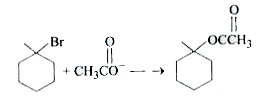Which of the following reaction will not affected on increasing the pressure ?
2H2(g)+CO(g)⇔CH3OH(g)
4NH3(g)+5O2(g)⇔4NO(g)+6H2O(g)
CH4(g)+2S2(g)⇔CS2(g)+2H2S(s)
PCl5(g)⇔PCl3(g)+Cl2(g)
The correct Answer is:C
To determine which reaction will not be affected by an increase in pressure, we can use Le Chatelier's principle. This principle states that if an external change is applied to a system at equilibrium, the system will adjust to counteract that change.
1. Understand the Concept of ΔNg:
- ΔNg (change in the number of gaseous moles) is calculated as the number of moles of gaseous products minus the number of moles of gaseous reactants.
- If ΔNg = 0, the reaction is not affected by changes in pressure.
2. Analyze Each Reaction:
- For each given reaction, we will calculate ΔNg.
3. Example 1:
- Reaction: A(g) + B(g) ⇌ C(g) + D(g)
- Count moles: 2 moles of reactants (A + B) and 2 moles of products (C + D).
- ΔNg = (moles of products) - (moles of reactants) = 2 - 2 = 0.
- Conclusion: This reaction is not affected by pressure.
4. Example 2:
- Reaction: E(g) + F(g) ⇌ G(g)
- Count moles: 2 moles of reactants (E + F) and 1 mole of product (G).
- ΔNg = 1 - 2 = -1.
- Conclusion: This reaction will shift towards the products when pressure is increased.
5. Example 3:
- Reaction: H(g) ⇌ I(g) + J(g)
- Count moles: 1 mole of reactant (H) and 2 moles of products (I + J).
- ΔNg = 2 - 1 = 1.
- Conclusion: This reaction will shift towards the reactants when pressure is increased.
6. Final Conclusion:
- The only reaction that has ΔNg = 0 is the one where the number of gaseous moles does not change. Therefore, this reaction will not be affected by an increase in pressure.
- ΔNg (change in the number of gaseous moles) is calculated as the number of moles of gaseous products minus the number of moles of gaseous reactants.
- If ΔNg = 0, the reaction is not affected by changes in pressure.
- For each given reaction, we will calculate ΔNg.
- Reaction: A(g) + B(g) ⇌ C(g) + D(g)
- Count moles: 2 moles of reactants (A + B) and 2 moles of products (C + D).
- ΔNg = (moles of products) - (moles of reactants) = 2 - 2 = 0.
- Conclusion: This reaction is not affected by pressure.
- Reaction: E(g) + F(g) ⇌ G(g)
- Count moles: 2 moles of reactants (E + F) and 1 mole of product (G).
- ΔNg = 1 - 2 = -1.
- Conclusion: This reaction will shift towards the products when pressure is increased.
- Reaction: H(g) ⇌ I(g) + J(g)
- Count moles: 1 mole of reactant (H) and 2 moles of products (I + J).
- ΔNg = 2 - 1 = 1.
- Conclusion: This reaction will shift towards the reactants when pressure is increased.
- The only reaction that has ΔNg = 0 is the one where the number of gaseous moles does not change. Therefore, this reaction will not be affected by an increase in pressure.
Topper's Solved these Questions
- EQUILIBRIUM BOOK - NCERT FINGERTPS ENGLISHCHAPTER - EQUILIBRIUM EXERCISE - HOTS
6 Videos
- EQUILIBRIUM BOOK - NCERT FINGERTPS ENGLISHCHAPTER - EQUILIBRIUM EXERCISE - EXEMPLAR PROBLEMS
19 Videos
- ENVIRONMENTAL CHEMISTRYBOOK - NCERT FINGERTPS ENGLISHCHAPTER - ENVIRONMENTAL CHEMISTRYEXERCISE - Assertion And Reason
15 Videos
- HYDROCARBONS BOOK - NCERT FINGERTPS ENGLISHCHAPTER - HYDROCARBONS EXERCISE - Assertion And Reason
15 Videos
Similar Questions
Which of the following reactions will get affected by increasing the pressure? Also, mention whether change will cause the reaction the reaction to go into forward of backward direction.
a. COCl2(g)⇔CO(g)+Cl2(g)
b. CH4(g)+2S2(g)⇔CS2(g)+2H2S(g)
c. CO2(g)+C(s)⇔2CO(g)
d. 2H2(g)+CO(g)⇔CH3OH(g)
e. CaCO3(s)⇔CaO(s)+CO2(g)
f. 4NH3(g)+5O2(g)⇔4NO(g)+6H2O(g)
View SolutionWhich of the following reactions will not be affected by increasing the pressure?
View Solution
Knowledge Check
Which of the following reactions will go faster if the concentration of the nucleophile is increased ?
A B
B C
C DNo comparison between these reactions
DNo comparison between these reactions
Which of the following factors will not affect the degree of ionisation ?
View SolutionWhich of the following does not affect light phase
View SolutionWhich of the following factor affect diffusion rate?
View SolutionIn which of the following reactions, increase in the pressure at constant temperature does not affect the moles at equilibrium?
View SolutionWhich of the following does not affect the rate of reaction?
View SolutionWhich of the following reactions proceed at low pressure?
View SolutionWhich of the following affect the heat of reaction?
View Solution
